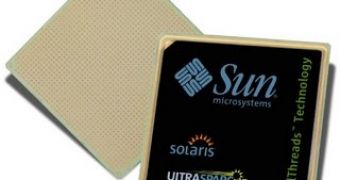Sun Microsystems has employed Taiwan Semiconductor Manufacturing Co. to build its upcoming multi-core, 450-nanometer processors. This might be seen as the end of a long partnership with Sun's original foundry, Texas Instruments. The latter decided that would collaborate with other chip designers on its process development at the 45-nanometer node.
Sun's choice of TSMC was a natural thing, given the fact that Texas Instruments itself wanted it as a partner in the 45-nanometer technology. Sun is currently selling its older, 65-nanometer technology in its Niagara processors. The 65-nanometer node will not be phased out; on the contrary, the next chip from Sun, the Rock, will also be built on it. The server vendor has no plans to start producing 45-nanometer CPUs yet, but according to Fadi Azhari, director of marketing for Sparc technology at Sun, the company has some of these chips on the drawing board.
"We have had engineering teams working for months now on 45nm designs and we will have multiple 45nm products," Azhari said.
The partnership agreement does not cover any other system-level ASICs that Sun will design for use within its own server offerings or for some other proprietary products. Moreover, the number of system ASICS is continuously decreasing as Sun embeds Ethernet controllers and security accelerators directly into the CPUs.
The financial terms of the deal are still undisclosed. However, Sun wishes in TSMC more than a foundry partner, but rather a sales channel to provide Sparc cores to its foundry customers. "That's the desired goal long term. The first step is to do university outreach," said Azhari. "They have excellent connections with universities in Taiwan," he added.
TSMC will have its share of profit, too. Despite the fact that the Taiwanese company is manufacturing a large variety of microchips, it has never produced a complex server processor such as Sun's design. TSMC may be regarded as one of the few foundries that have never attempted to create a clone of an Intel x86 processor.

 14 DAY TRIAL //
14 DAY TRIAL //